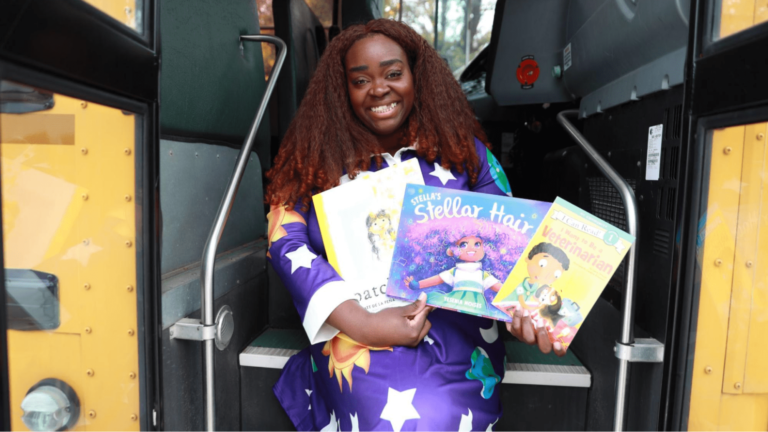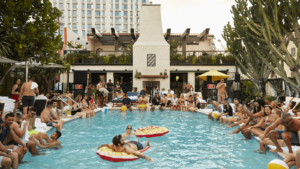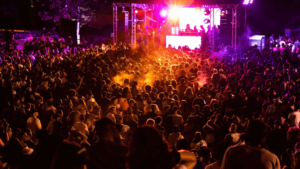OK, this is it: you’ve got an amazing event idea, locked down your venue, and negotiated your talent line-up.
Unfortunately, that was the easy part — now you’ve got to market your event and sell some tickets!
Event marketing is all about getting the right messaging out to the right people so that you can sell tickets and get attendees through the door. But to do so, you’ll need to spread your event messaging across multiple platforms and formats and over a period of time.
Eventbrite is the world’s largest events community, and we help hundreds of thousands of event creators all over the world develop and promote their upcoming events every single day.
Better yet, we’ve also got a wide range of Marketing Tools that can help you execute your entire event marketing plan flawlessly.
Read on to download our template and find out the key stages to include in your event marketing plan.
Event Marketing Plan

Start planning with Eventbrite’s free event marketing plan template
Not every event creator is a natural when it comes to event marketing. That’s why a premade template to help develop your event marketing strategy can really help.
An event marketing plan template is also a smart way to keep every team member in sync. You can use live, cloud-hosted documents to customize, tag, and hyperlink all the relevant information — all while maintaining a single source of truth that everyone on your team can use to steer their marketing projects.
Here’s how to use your event marketing plan template
To get started, we’ll walk you through each section and provide ideas (and real examples) of the types of promotional activities to use at each key stage.
8–12 months before your event
No matter what type of event you’re promoting, you should plan on kickstarting the marketing process as early as possible.
By giving yourself a minimum of eight months, you’ll be able to carefully consider each element of your event marketing strategy to make sure you’re ticking all the right boxes to optimize your content and land major ticket sales.
- Identify your target audience. To create an effective event marketing plan, you need to know who your customers are, what they want to see in an event, and identify which channels they use — such as TikTik for Gen Z.
- Create social media blasts. Let the world know about your event with announcements on your social media channels, sharing that there’s a new event on the horizon. Include CTAs, such as to “secure a ticket with an early bird discount”.
- Create a content calendar. Social media and email production are a huge part of event marketing. Use automation tools for social media, such as Buffer or Hootsuite to schedule posts. Planning posts in advance with a content calendar will keep you on track and ensure you never have a content gap.
- Sign up to an event management platform. With Eventbrite, you can set up a custom-branded event page, and create different ticket types, seating arrangements, and discount codes to make your event searchable on the world’s largest events community.
This post from event creator Brickworld should give you an idea of the type of content to promote at this stage: event specifics, such as dates, locations, and the venue itself are good focal points.
By announcing ticket sales from the moment their Brickworld Chicago 2024 event went live, organizers put themselves in a great position to cultivate awareness early on and kick start ticket sales eight months out.
💡 Pro tip: Make sure you’ve got an accessible event page to start selling tickets the moment you start marketing your event.
Ready to start selling tickets?

3–4 months before your event
When you’re nearing four months to your event, you should have your line-up of speakers or entertainment confirmed. That means it’s time to create and distribute a series of email campaigns promoting your line-up.
- Publish social media posts to build excitement. A great way to engage your target audience is to introduce members of your line-up one by one — tagging each entertainer’s social channels to maximize your reach and encourage them to reshare to a larger audience.
- Create promotional material. If you’re working with an event sponsor or partner organizations, you should collaborate with them at this stage to create content they can share externally to promote their own involvement among stakeholders. This might involve working with them to develop email marketing campaigns, video testimonials, or branded graphics to create their own printed collateral.
- Launch paid media campaigns. By putting some money behind your social content to boost posts, you’ll be able to target (or retarget) potential attendees who are more likely to convert and buy tickets.
- Partner with people and organizations for social media content. This is the perfect time to initiate collaborative social media content with brand sponsors, participating vendors, or industry influencers.
- Expand your reach with ads. Boost your event’s visibility using Eventbrite Ads. Receive more visibility on your homepage and for search results with event management software.
This post from event creator Ball Drop is a great example of how you can start teasing your audience with an upcoming event like their New Year’s Eve Gala around the three-month mark.
It’s short, sweet and to the point — not to mention uses engaging and on-brand graphics. But most importantly, it points directly to where followers can buy a ticket for the event.
💡 Pro tip: If you want to save money on your paid campaigns, make sure you’re using a platform like Eventbrite to optimize your paid posts.
With the help of A/B testing, AI-generated content to inspire you, and scheduling recommendations, you can achieve your social campaign goals without breaking the bank.

2 months before your event
With two months to go, your marketing plan has to start focusing on teaser content and generating ticket sales.
- Create teaser content. Update your website, event page, and any relevant blog posts with teaser content showcasing footage from previous events or rehearsals to build a sense of FOMO and show your target audience what’s on the horizon.
- Automate email marketing campaigns. Consider kickstarting automated email marketing campaigns that not only promote your event to non-registrants but also keep ticket holders warm by reminding them of key event details.
If you want to see how influencer marketing is done the right way, look no further than event creator Pretty Princess Parties.
Founder Jodi Polaski regularly utilizes movers and shakers across the children’s entertainment space (as well as local communities) to showcase the best of Pretty Princess Parties events and give parents social proof to feel confident purchasing tickets.
💡 Pro tip: If you want to streamline your automated email campaigns, try using Eventbrite’s integration with Mailchimp. It enables you to pull data directly from your registrations list into a new Mailchimp audience to create seamless customer journeys.
1 week before your event
With one week to go, we’re getting into crunch time.
- Send email and SMS reminders. Your event promotion timeline is shrinking — so at this point, you should be focusing your efforts on both email and SMS reminders to ticket holders.
- Collaborate with influencers. Choose established influencers to help give your social media following a boost for a fee. In fact, 81% of social media users say they’ve ended up buying a product because they’ve seen somebody else posting about it on social.
- Create social media urgency. A great way to catch the eye of users is to post some behind-the-scenes footage to show potential attendees how amazing the venue is looking, host a ticket giveaway, or create a contest to drive engagement and develop a sense of pull towards your upcoming event.
If you need a bit of inspiration in this department, check out creator Bollywood Dreams.
Founder DJ Prashant always hits the right notes in the run-up to his club events with engaging reminders, last-minute offers, and exclusive ticket giveaways to get stragglers over the finish line and get them out to party.
💡 Pro tip: Want to automate your reminders? If you’re using Eventbrite, we’ll automatically set up an email reminder to go out to your attendees 48 hours before the event starts. But you can customize the content to make sure ticket holders are getting all the essential info they’ll need on the day.

During your event
Just because the venue doors are open and your guests are lined up doesn’t mean your event marketing is complete.
- Dispatch emails. Set up email reminders to registrants on the day of your event answering any common questions that might come up. You should also signpost essential information like parking and check-in procedures and also include contact information if ticket holders have issues.
- Create fear of missing out (FOMO). Integrate on-the-day content in your marketing strategy to create some FOMO and show off your event to all of your followers who couldn’t make it. You could post behind-the-scenes imagery to give followers a backstage seat to the action, reels of your crowd lining up, or even live stream some of the action.
For lessons in best practice, take a look at Eventbrite creator Bob’s Dance Shop.
They do an amazing job at keeping followers up-to-date with content during their events — including previews and reminders to anybody at home to drop what they’re doing and come to their event.
💡 Pro tip: Begin planning for your next event already by making sure you have a professional photographer in place who can take high-quality visuals that you can use for promotional material for future events.
2 days after your event
Your post-event marketing should focus on de-briefing your attendees — and showing off your amazing event to everybody that missed out.
- Send attendees a thank you email. Create and distribute email campaigns to send a thank you to registrants who showed up to your event. Make sure to encourage them to buy tickets for your next event.
- Send a post-event survey. A post-event survey can get you valuable feedback from attendees on what they loved about your event — and what could have been better.
- Upload post-event social media content. On social, your post-event content might include a highlights reel or some of the best photos from your event. If you had a contest at your event, it’s also a great idea to name the winners on social and tag them so that you create more opportunities for engagement.
Event creator Art Battle International does this really well. Their post-event content gives followers a quick taste of what they missed — and they always tag artists and venues to get more people involved in the conversation.
💡 Pro tip: Planning a post-event survey? According to the experts over at SurveyMonkey, the best time to send out a survey is between 48 hours and 72 hours after the event has finished.
2 weeks after your event
Two weeks after your event has finished, you can start winding things down — but that doesn’t mean you should stop marketing.
- Share content from your event. Keep followers engaged in between events by showcasing unused content from your event to remind attendees how much fun they had (and remind everybody else how jealous they are for not attending). This can also drive traffic to your Eventbrite page or your website — enabling people to discover your upcoming events and get tickets.
- Review your analytics. You should be taking an in-depth look at your social engagement, email numbers, website figures, and any other analytics tool at your disposal to assess how your promotional content performed.
Having access to a tool like Eventbrite Marketing Tools can streamline this process because you’ll have all the key information sitting on one convenient dashboard. Likewise, you’ll already have all of your attendance figures to determine who showed up, who engaged, and which segments of your target audience you could do a better job engaging with in the future.
For best practices in posting on social after your event, take a look at creator VIP Nightlife. The post-event highlights reel of their Maxim Halloween Party in LA is an absolute masterclass in making people wish they’d bought tickets:
💡 Pro tip: If you held a virtual event or a hybrid event, don’t forget to send one final reminder around the two-week mark reminding users that they can access your event content on-demand. This ensures all your attendees get the most out of available content.

Ready to complete your event marketing plan?
OK: You’ve got the perfect event marketing plan template, you know how to complete it, and you’ve got some examples of promotional content that’ll hit home with your target audience.
Now, it’s your time to shine.
Download our free event marketing plan template, and tick off the steps as you complete them to improve your chances of hosting a successful event.






